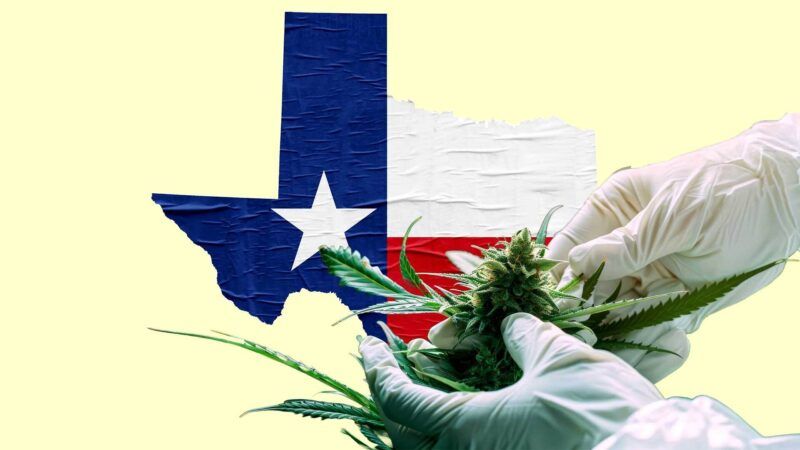Texas Bans Delta-8 THC, Which Is Only Popular Because of Prohibition
Six years after legalizing hemp and its by-products, the state is revising its drug policies and criminalizing products sold by thousands of Texas businesses.

This week, the Texas House of Representatives passed a bill outlawing an intoxicating substance derived from hemp, just six years after legalizing it. Ironically, prohibition is what created the problem in the first place.
Senate Bill 3, which passed the Texas Senate in March, would ban all forms of tetrahydrocannabinol (THC) in the state. "Since 2019, retailers across Texas have exploited a state agriculture law to sell life-threatening, unregulated forms of Tetrahydrocannabinol to Texans, including children," Texas Lt. Gov. Dan Patrick (a Republican) said in March, in support of the bill. "These stores which often target children with their marketing have popped up across the state, threatening the safety of our communities."
The Agriculture Improvement Act of 2018 officially legalized hemp at the federal level, by defining it as any part of the Cannabis sativa plant "with a delta-9 tetrahydrocannabinol concentration of not more than 0.3 percent." Many states, including Texas, soon followed suit, passing farm bills at the state level using the same percentage.
Hemp and marijuana both come from the Cannabis sativa plant. Delta-9 THC is the psychoactive ingredient in marijuana, which causes a "high" when ingested. While THC occurs naturally in marijuana—at a 15 percent concentration, on average—it's only present in trace amounts in hemp.
In 1967, an Israeli chemist synthesized a separate compound, delta-8. On a molecular level, delta-8 is nearly identical to delta-9, and it produces a similar but milder intoxicating response when ingested. Delta-8 also only occurs in small amounts but it can be synthesized using CBD, which comes from hemp.
Once the farm bills became law, hemp production exploded, flooding the market within a growing season. The industry pivoted, using hemp surpluses to manufacture intoxicating delta-8 products.
It worked: A 2022 whitepaper from the Brightfield Group, a market research firm, found the industry grossed nearly $2 billion from delta-8 in two years.
This is why unregulated delta-8 products of dubious quality started popping up in gas stations and convenience stores all across the country. Texas alone now has more than 7,000 registered hemp retailers.
"State regulations governing hemp products vary widely and are unevenly enforced, creating a patchwork of rules that can change dramatically from one state to the next," according to a 2024 report by Michelle Minton and Geoffrey Lawrence of Reason Foundation, the nonprofit that publishes this magazine. "Consumers face an increasingly confusing array of products of uncertain quality while businesses must navigate a shifting and uncertain regulatory environment."
Patrick is right that delta-8 appeals to young people: A 2023 study found more than 11 percent of high schoolers reported having used delta-8 products in the previous year. (In the same period, over 30 percent reported using marijuana.)
But it should come as no surprise that prohibition—specifically, of marijuana—has the most direct impact on delta-8's sudden popularity. As that same 2023 study pointed out, the prevalence of delta-8 use was higher "in the South and Midwest US and in states without legal adult-use marijuana."
"Higher [delta-8] use in states without medical or adult-use cannabis laws suggests that cannabis prohibition may unintentionally promote [delta-8] use," according to another study the following year.
It's not that people are excited to use a substance that is like marijuana, but less potent and potentially more dangerous; rather, consumers are choosing an inferior product because it's easier to get and not illegal.
By passing S.B. 3, Texas is criminalizing a product sold by thousands of stores that only opened because the state government legalized it.
State Rep. James Talarico (D–Austin) called the repeal "the nanny state at its worst" in comments from the chamber floor. "Instead of regulating this booming industry in our state, we are now going backwards to the days of prohibition. This bill is not going to stop Texans from smoking weed or eating edibles, just because a bunch of politicians in Austin tell them not to. Texans will still use THC, but instead of getting it safely from a local small business, they'll now get it from the black market, from the drug cartels. This ban is a gift to the cartels."


Show Comments (38)